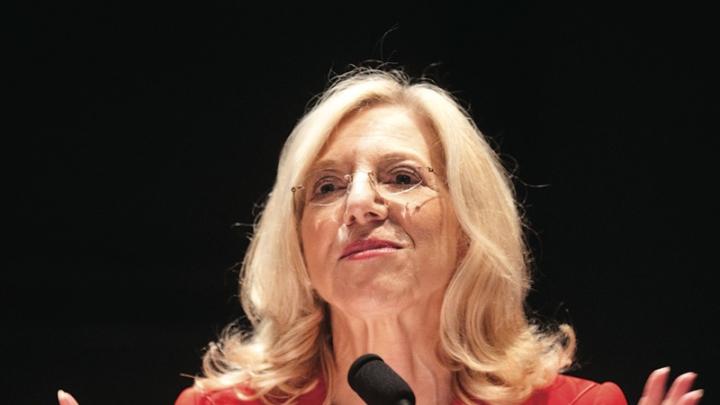In 1960, the idea that Harvard undergraduates could concentrate in a field that pulled together economics, political science, sociology, history, and philosophy, instead of choosing just one of those disciplines, was revolutionary.
Social studies (the College’s second-oldest interdisciplinary concentration, after history and literature) was “ahead of its time,” said University of Pennsylvania president Amy Gutmann ’71, Ph.D. ’76, one of the program’s eminent graduates. Giving the keynote address at the concentration’s fiftieth anniversary celebration on September 25, she noted that fellow alumni work in “political science and polling, journalism and jazz, economics and history, law and medicine, sociology and philosophy, corporate law and investing, the judiciary and, very importantly, public service.” Regardless of one’s chosen profession, Gutmann said, “you cannot do better--intellectually, ethically, and practically speaking--than to come to terms with the question: What is a well-constituted society and what is my role in it?”
The program confronts concentrators with this question immediately in its famously intense sophomore tutorial, Social Studies 10. The tutorial’s reading list has displayed remarkable consistency since the beginning, noted Rogers Brubaker ’79, a program veteran who is now a sociology professor at UCLA. Seven theorists--Adam Smith, Karl Marx, John Stuart Mill, Max Weber, Alexis de Tocqueville, Émile Durkheim, and Sigmund Freud--have been taught nearly every year; Michel Foucault, Jürgen Habermas, and Simone de Beauvoir were added in the 1990s and have been taught every year since. This roster, Brubaker said, “speaks to the program’s defining and abiding commitment to serious engagement with the great theorists of the epochal transformations--social, political, economic, and cultural--that have formed the world that we still inhabit.”
An afternoon panel on “Social Studies and Social Change” featured four other notable concentration alumni.
- During her career, Adele Simmons ’63 has conducted anthropology research in Mauritius, worked for the Economist in North Africa, taught at Princeton, served as president of Hampshire College (during her tenure, it became the first U.S. college to divest its South Africa-affiliated holdings to protest apartheid), and headed the MacArthur Foundation.
- E.J. Dionne ’73, Washington Post columnist and Georgetown Public Policy Institute professor, is the author of several books on American politics and a senior fellow at the Brookings Institution.
- Attorney Jarrett Barrios ’91, a former Massachusetts state legislator, is now president of the Gay and Lesbian Alliance Against Defamation (GLAAD).
- Former deputy U.S. attorney general Jamie Gorelick ’72, J.D. ’75, served on the 9-11 Commission and as general counsel to the Defense Department; she now chairs the public-policy and strategy practice and national security practice for WilmerHale in Washington.
Gorelick said her social-studies education taught her to argue with courage, respect, and a spirit of compromise, and to consider thoughtfully the exercise of state power. “While I cannot tell you that I sat in my study these 35 years since I graduated and pulled Durkheim and Weber and Freud and Marx off the shelves,” she said, “those ideas affected me enormously. I am very much in debt to this concentration for the powerful ideas it has put at my disposal.”
Introducing the afternoon panel, political philosopher and former social-studies chair Michael Walzer, Ph.D. ’62, now a professor emeritus at the Institute for Advanced Study, recalled that, within the concentration, “Like-minded never meant agreeable. Most of the time, we agreed on what were the necessary arguments, but not at all on what were the right positions.…Anyone with convictions about anything had to be ready to defend them in the face of sharp and skeptical questioning.”
It was perhaps appropriate, then, that protest accompanied, and at times interrupted, the day’s events. The protesters objected to the social-studies committee’s decision to accept a $650,000 endowment for an undergraduate research fund, given by alumni and other supporters of New Republic editor in chief Martin Peretz, Ph.D. ’66, a former head tutor who taught at Harvard for more than 30 years. Several dozen people picketed outside the Science Center, holding signs quoting from Peretz’s writings about Muslims, including a September 4 blog post that attracted national attention.
Outside the Science Center classroom where the event was held, University police officers stood guard, limiting entry to registered guests. Still, questions about the decision to honor Peretz pervaded nearly every question-and-answer session. When he walked from the morning panels to a luncheon in Adams House, the protesters tailed him, chanting, “Harvard, Harvard, shame on you for honoring a racist fool!” At lunch, when he rose to give brief remarks as had other head tutors, a handful of attendees walked out.
Earlier in the week, President Drew Faust had stated publicly that in accepting the money, Harvard was not endorsing Peretz’s views (see “After the Storm: Presidential Perspectives,” page 53). Jamie Gorelick, who had led the effort to create the fund in Peretz’s name, echoed this sentiment; she described him to the panel audience as “a fantastic teacher” who was supportive and generous with his time. “You can honor him as a teacher,” she said, “without agreeing with everything he’s ever said.”








